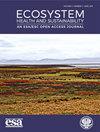Development of a Water Quality Management Model for Dry Rivers in Arid Regions: Application on Wadi Rumah, Saudi Arabia
IF 3.4
2区 环境科学与生态学
Q1 ECOLOGY
引用次数: 3
Abstract
In dry rivers, urban wastewater discharge forms a pond in the dry period, and surface runoff shapes a longer pond in the wet period. A water quality management model developed for dry rivers is applied on Wadi Rumah in Saudi Arabia. The sub-basin was delineated from 30-m × 30-m spatial resolution digital elevation model. Hydrologic loss, runoff rates, and time of concentration were determined using the soil conservation service curve number, soil conservation service unit hydrograph methods, and Kirpich formula. Hydrologic Engineering Center Hydrologic Modeling System estimated the wet weather flows for 10 low-to-medium rainfall events. A steady-state hydrodynamic model including river flows, effluent discharge, and evaporation and infiltration losses estimated the hydraulic retention time for the explicit case of ponding conditions of dry rivers. Mass balance and first-order kinetics modeled the physical (total dissolved solid and total suspended solid), chemical (biochemical oxygen demand, dissolved oxygen, chemical oxygen demand, NH 3 , PO 4 , and Cl 2 ), and microbiological (total coliform and fecal coliform) parameters. The hydrodynamic model and biokinetic rate coefficients were calibrated with satellite images, reported literature, and field measurements. A water quality index compared the aggregated water quality against the standards for 4 intended uses. The study yields “very good” water quality for restricted and unrestricted irrigation for the dry period, “fair” for livestock drinking, and “marginal” for fishery and recreation for the dry period, while water quality remained “marginal” for all the uses in the wet period. Water quality management implies regular water quality monitoring, continuous improvement of treatment facilities, and flood plain management initiatives for the long-term sustainability of dry rivers in arid regions.干旱地区干旱河流水质管理模型的开发——在沙特阿拉伯Wadi Rumah的应用
在干旱的河流中,城市污水排放在干旱期形成池塘,而地表径流在湿润期形成更长的池塘。为干旱河流开发的水质管理模型应用于沙特阿拉伯的Wadi Rumah。利用30-m×30-m空间分辨率数字高程模型对该子盆地进行了划分。使用土壤保持服务曲线数、土壤保持服务单位过程线方法和Kirpich公式确定水文损失、径流量和集中时间。水文工程中心水文建模系统估计了10次中低降雨量事件的潮湿天气流量。包括河流流量、污水排放、蒸发和渗透损失在内的稳态水动力学模型估计了干旱河流积水条件下的水力滞留时间。质量平衡和一级动力学模拟了物理(总溶解固体和总悬浮固体)、化学(生化需氧量、溶解氧、化学需氧量、NH3、PO4和Cl2)和微生物(总大肠菌群和粪大肠菌群)参数。流体动力学模型和生物动力学速率系数通过卫星图像、报道的文献和现场测量进行了校准。水质指数将综合水质与4个预期用途的标准进行了比较。该研究得出,干旱期限制性和非限制性灌溉的水质“非常好”,牲畜饮用的水质“尚可”,干旱期渔业和娱乐的水质“边际”,而湿润期所有用途的水质仍然“边际”。水质管理意味着定期监测水质,不断改善处理设施,并采取洪泛区管理举措,以实现干旱地区干旱河流的长期可持续性。
本文章由计算机程序翻译,如有差异,请以英文原文为准。
求助全文
约1分钟内获得全文
求助全文
来源期刊

Ecosystem Health and Sustainability
Environmental Science-Management, Monitoring, Policy and Law
CiteScore
7.10
自引率
2.00%
发文量
40
审稿时长
22 weeks
期刊介绍:
Ecosystem Health and Sustainability publishes articles on advances in ecology and sustainability science, how global environmental change affects ecosystem health, how changes in human activities affect ecosystem conditions, and system-based approaches for applying ecological science in decision-making to promote sustainable development. Papers focus on applying ecological theory, principles, and concepts to support sustainable development, especially in regions undergoing rapid environmental change. Papers on multi-scale, integrative, and interdisciplinary studies, and on international collaborations between scientists from industrialized and industrializing countries are especially welcome.
Suitable topics for EHS include:
• Global, regional and local studies of international significance
• Impact of global or regional environmental change on natural ecosystems
• Interdisciplinary research involving integration of natural, social, and behavioral sciences
• Science and policy that promote the use of ecological sciences in decision making
• Novel or multidisciplinary approaches for solving complex ecological problems
• Multi-scale and long-term observations of ecosystem evolution
• Development of novel systems approaches or modeling and simulation techniques
• Rapid responses to emerging ecological issues.
 求助内容:
求助内容: 应助结果提醒方式:
应助结果提醒方式:


